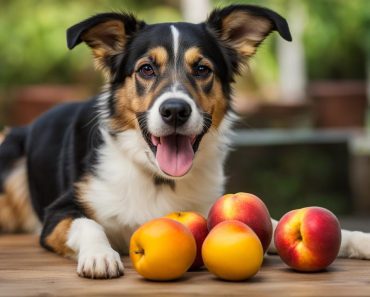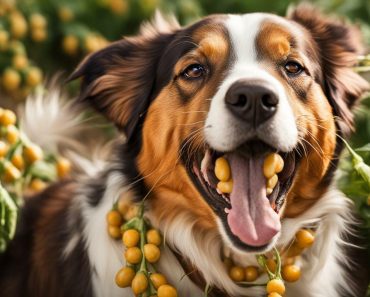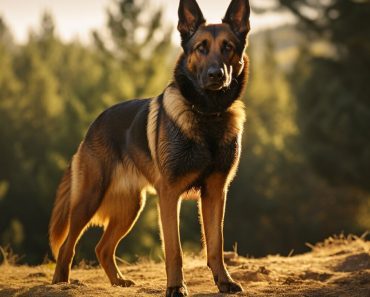
As a responsible pet owner, you may have wondered, “Can dogs eat chickpeas?” Let’s delve into the truth behind whether this nutritious legume is safe for our furry friends.
Chickpeas, also known as garbanzo beans, can be safely consumed by dogs. They are a healthy source of protein, fiber, and essential vitamins and minerals. However, it is important to feed chickpeas in moderation and avoid adding spices or seasonings. Canned chickpeas should be rinsed to remove excess salt before feeding them to dogs. Hummus, which contains additional ingredients like garlic and onion, should not be given to dogs. Chickpea flour is safe for dogs and can be used in homemade treats. Raw chickpeas are difficult to digest, so they should be soaked and cooked before feeding them to dogs. Roasted chickpeas may contain added spices and should be avoided unless they are cooked plain. Overall, chickpeas can be a healthy addition to a dog’s diet when prepared and served appropriately.
Key Takeaways:
- Chickpeas can be safely consumed by dogs and provide essential nutrients.
- Feed chickpeas in moderation and avoid adding spices or seasonings.
- Rinse canned chickpeas to remove excess salt before feeding them to dogs.
- Avoid giving dogs hummus, which contains additional ingredients like garlic and onion.
- Chickpea flour is safe for dogs and can be used in homemade treats.
Stay tuned for the next sections as we explore the health benefits of chickpeas for dogs, their role as a source of protein and fiber, and how to safely incorporate them into your furry friend’s diet.
The Health Benefits of Chickpeas for Dogs
Incorporating chickpeas into your dog’s diet can provide a range of health benefits and serve as a nutritious addition to their meals. Chickpeas, also known as garbanzo beans, are packed with protein and fiber, which can support your dog’s overall well-being.
Protein is essential for dogs as it helps to build and repair tissues, support muscle growth, and promote a healthy immune system. Chickpeas are a plant-based source of protein that can be easily incorporated into your dog’s diet. They are an excellent alternative to meat-based proteins and are suitable for dogs with dietary restrictions or allergies.
Fiber is important for maintaining a healthy digestive system. It aids in digestion, regulates bowel movements, and can help prevent constipation. Chickpeas are a great source of dietary fiber, which can promote healthy digestion in dogs. Adding chickpeas to their meals can help support a regular and healthy digestive process.
Furthermore, chickpeas are rich in essential vitamins and minerals, including folate, iron, potassium, and magnesium. Folate is important for cell division and growth, while iron is necessary for the production of red blood cells. Potassium and magnesium play a vital role in maintaining proper muscle function and nerve transmission. By incorporating chickpeas into your dog’s diet, you can ensure they receive these important nutrients.
To summarize, chickpeas can offer numerous health benefits to your furry friend. They provide a good source of protein, fiber, and essential vitamins and minerals. When prepared and served appropriately, chickpeas can be a valuable addition to your dog’s diet. Remember to introduce chickpeas gradually and monitor your dog for any adverse reactions. Consult with your veterinarian for personalized advice on incorporating chickpeas into your dog’s diet.
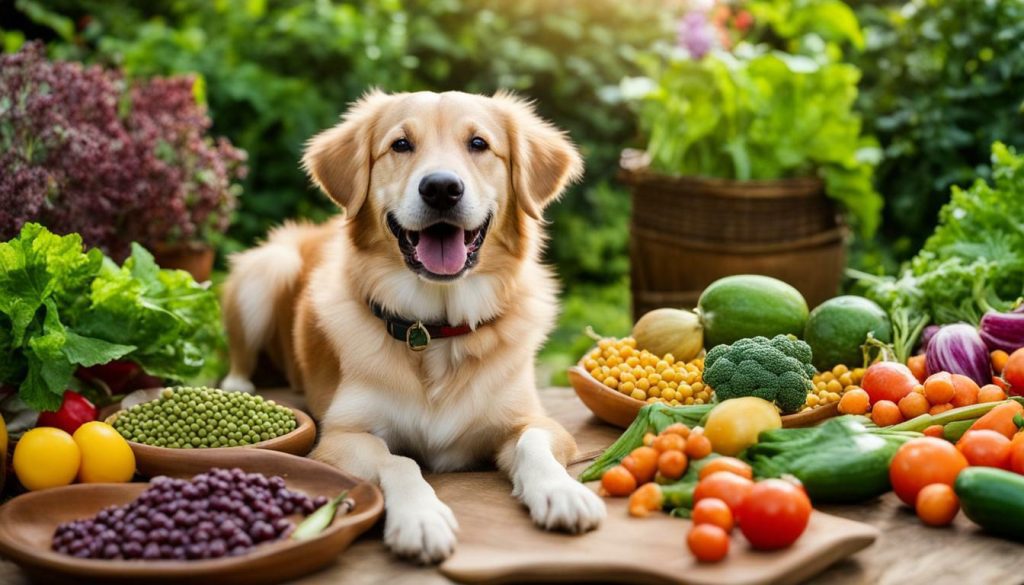
Chickpeas as a Source of Protein and Fiber
Chickpeas are packed with protein and fiber, making them a great natural supplement to support your dog’s energy levels and digestive health. These legumes contain approximately 20 grams of protein per 100 grams, which is essential for building and repairing muscles in your furry friend’s body. Protein also aids in maintaining a healthy coat and skin, promoting overall wellness.
The high fiber content in chickpeas promotes proper digestion and helps regulate bowel movements in dogs. Fiber acts as a natural prebiotic, feeding the beneficial bacteria in their gut and promoting a healthy digestive system. This can be especially beneficial for dogs with sensitive stomachs or those prone to gastrointestinal issues.
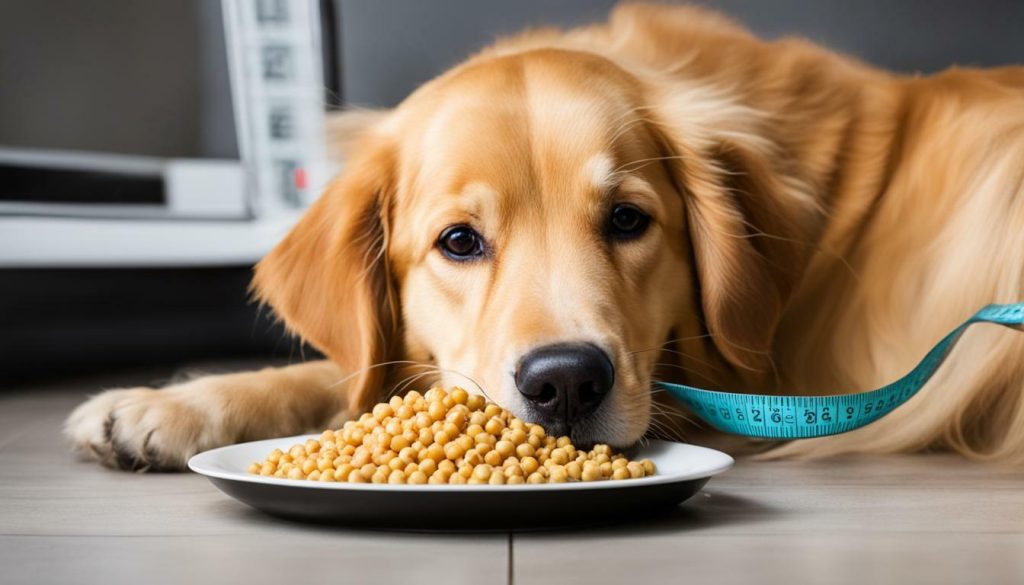
Additionally, chickpeas are low in fat and cholesterol, making them an ideal alternative to other high-calorie treats. They offer a satisfying crunch and can be used as a healthy snack or as a part of your dog’s regular meal. However, it’s important to remember that moderation is key. Too many chickpeas can lead to digestive upset or gas, so it’s best to introduce them gradually and observe your dog’s response.
Nutrient Content of Chickpeas
| Nutrient | Amount per 100g |
|---|---|
| Protein | 20g |
| Fiber | 7.6g |
| Potassium | 291mg |
| Magnesium | 48mg |
| Folate | 557mcg |
As shown in the table above, chickpeas are not only rich in protein and fiber but also contain essential minerals such as potassium and magnesium. They are also a great source of folate, which plays a vital role in the production of red blood cells and DNA synthesis. These nutrients contribute to your dog’s overall well-being and support their immune system.
Incorporating chickpeas into your dog’s diet can provide them with a variety of health benefits. However, it’s important to consult your veterinarian before making any significant changes to your dog’s diet, especially if they have any underlying health conditions or dietary restrictions. With the right precautions and appropriate serving sizes, you can safely introduce chickpeas as a nutritious addition to your furry friend’s meals.
Important Nutrients in Chickpeas for Dogs
Chickpeas are not only rich in protein and fiber but are also loaded with vital nutrients like iron, zinc, and magnesium, which are important for your dog’s overall nutrition. These nutrients play a crucial role in supporting your dog’s immune system, promoting healthy digestion, and maintaining strong bones and muscles.
Iron is essential for the production of red blood cells, which carry oxygen throughout your dog’s body, while zinc is important for immune function, wound healing, and healthy skin and coat. Magnesium, on the other hand, is involved in various bodily processes, including nerve function and energy production.
Including chickpeas in your dog’s diet can provide these beneficial nutrients, helping to ensure they receive a well-rounded and balanced meal. However, it is important to keep in mind that chickpeas should be served in moderation and prepared in a suitable manner.
To incorporate chickpeas into your dog’s diet, you can try adding them to their regular meals or using chickpea flour as an ingredient in homemade treats. Just be sure to cook the chickpeas thoroughly to aid in digestion and avoid any potential digestive issues that raw chickpeas may cause.

When introducing chickpeas to your dog’s diet, it’s always a good idea to consult with your veterinarian to ensure it aligns with their individual dietary needs. With proper preparation and portion control, chickpeas can be a nutritious and tasty addition to your furry friend’s meals.
Feeding Chickpeas to Dogs: Dos and Don’ts
While chickpeas offer numerous benefits, it’s crucial to follow some dos and don’ts when feeding them to your furry companion to ensure their well-being. Chickpeas can be a healthy addition to your dog’s diet, but it’s important to introduce them gradually and in moderation. Start with small portions and monitor your dog for any signs of digestive discomfort or allergies.
Dos:
- Soak and cook chickpeas before feeding them to your dog. Raw chickpeas are difficult to digest and may cause gastrointestinal issues.
- Include chickpeas as part of a balanced diet, alongside other high-quality protein sources.
- Rinse canned chickpeas thoroughly to remove excess salt. Excessive sodium intake can be harmful to dogs.
- Use chickpea flour in homemade dog treats as a nutritious alternative to traditional flour.
Don’ts:
- Avoid feeding your dog hummus or any chickpea dishes that contain additional ingredients like garlic, onion, or spices. These can be toxic to dogs and may cause digestive upset.
- Avoid giving your dog roasted chickpeas, as they may be seasoned with spices that can be harmful to dogs.
- Do not rely solely on chickpeas as the main source of protein for your dog. They should be part of a balanced diet in combination with other protein sources.
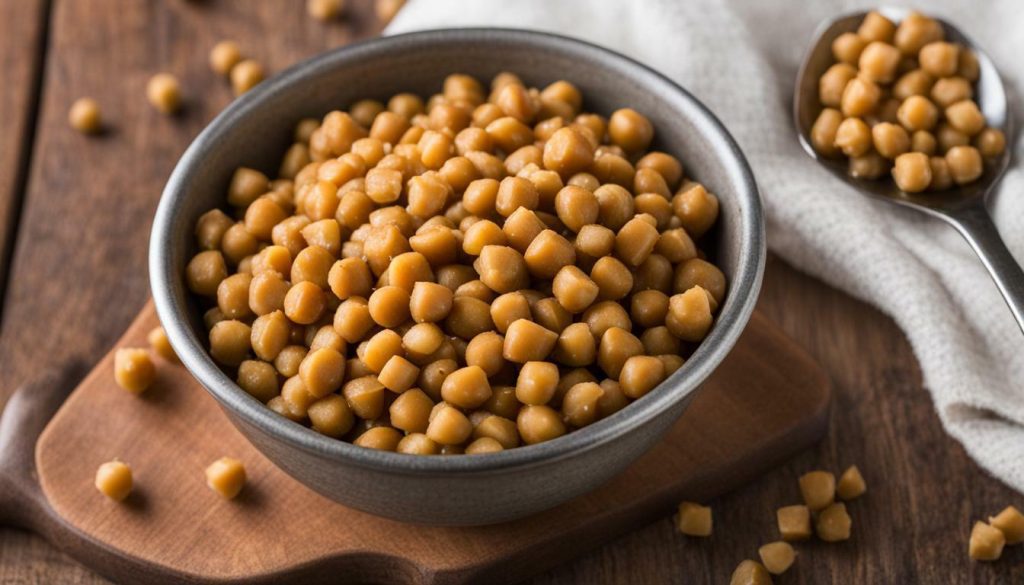
Feeding chickpeas to dogs can be a healthy and nutritious choice, provided that you follow the dos and don’ts mentioned above. Chickpeas offer a good source of protein, fiber, and essential nutrients for your furry friend. Remember to prepare and serve chickpeas appropriately by soaking and cooking them, avoid adding spices or seasonings, and introduce them gradually into your dog’s diet. With proper care and moderation, you can safely incorporate chickpeas into your dog’s meals or use chickpea flour in homemade treats, offering them a tasty and beneficial addition to their diet.
Preparing Chickpeas for Dogs
Before feeding chickpeas to your dog, it’s important to properly prepare them to optimize their digestion and nutrient absorption. Chickpeas, also known as garbanzo beans, can be a nutritious addition to a dog’s diet when cooked and served plain, without any added spices or seasonings. Here are some guidelines for preparing chickpeas for your furry friend.
Soaking and Cooking Chickpeas
To make chickpeas easier to digest for dogs, they should be soaked overnight in water. Soaking helps to soften the beans and remove some of the anti-nutrients that can interfere with nutrient absorption. After soaking, rinse the chickpeas thoroughly and cook them in fresh water until they are tender. Cooking times can vary, but it typically takes about 45 minutes to an hour.
Once the chickpeas are cooked, allow them to cool before serving them to your dog. You can serve them as a standalone treat or mix them with your dog’s regular food. Remember to portion the chickpeas appropriately based on your dog’s size and dietary needs.
Chickpea Flour for Homemade Treats
Another way to incorporate chickpeas into your dog’s diet is by using chickpea flour in homemade treats. Chickpea flour is a versatile ingredient that can be used to make biscuits, cookies, and even dog-friendly pancakes. When using chickpea flour, follow a recipe that is specifically formulated for dogs, and avoid adding any ingredients that may be harmful or toxic to canines.
| Chickpeas Dos and Don’ts for Dogs |
|---|
| Do soak and cook chickpeas before feeding them to your dog |
| Do serve chickpeas plain, without any added spices or seasonings |
| Do portion chickpeas appropriately based on your dog’s size and dietary needs |
| Don’t feed your dog raw chickpeas, as they can be difficult to digest |
| Don’t give your dog hummus or chickpeas with added ingredients like garlic or onion |
| Don’t offer roasted chickpeas unless they are cooked plain without added spices |
By following these guidelines and preparing chickpeas properly, you can safely introduce this nutrient-rich legume into your dog’s diet. Remember to consult with your veterinarian before making any significant changes to your dog’s feeding routine, especially if they have any pre-existing health conditions or dietary restrictions.
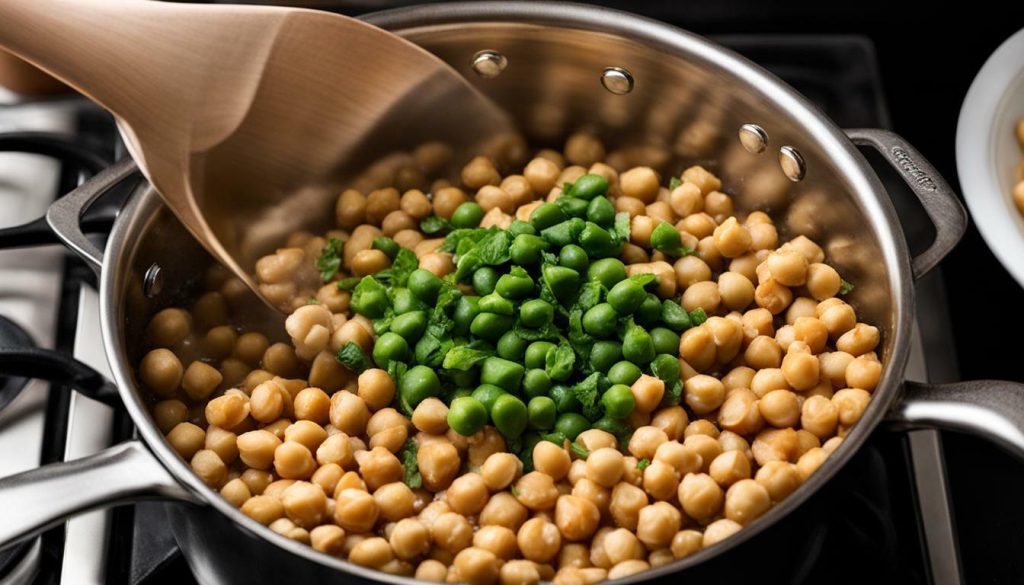
Canned Chickpeas: What You Need to Know
If you’re considering using canned chickpeas as a treat for your dog, it’s crucial to take some precautions to ensure their well-being. Canned chickpeas can be a convenient and nutritious option for dogs, but there are a few things to keep in mind before feeding them to your furry friend.
First, it’s important to rinse canned chickpeas thoroughly before offering them to your dog. This helps remove any excess salt or preservatives that may be present. Excessive salt intake can be harmful to dogs and may lead to dehydration or other health issues. By rinsing the chickpeas, you can reduce their sodium content and make them safer for your pup to enjoy.
Additionally, it is advisable to feed canned chickpeas in moderation. While they offer a range of health benefits, including protein, fiber, and essential nutrients, too much of a good thing can still pose a risk. Excessive consumption of chickpeas can cause digestive upset or lead to an imbalance in your dog’s diet. To prevent any potential issues, consider incorporating chickpeas as an occasional treat or as part of a well-rounded meal plan. Always consult with your veterinarian for specific recommendations based on the size, age, and overall health of your dog.
Remember, always check the ingredients list on the can before purchasing, as some canned chickpeas might contain added seasonings or other ingredients that are not suitable for dogs. Stick to plain, unsalted canned chickpeas to ensure your dog’s safety and well-being.
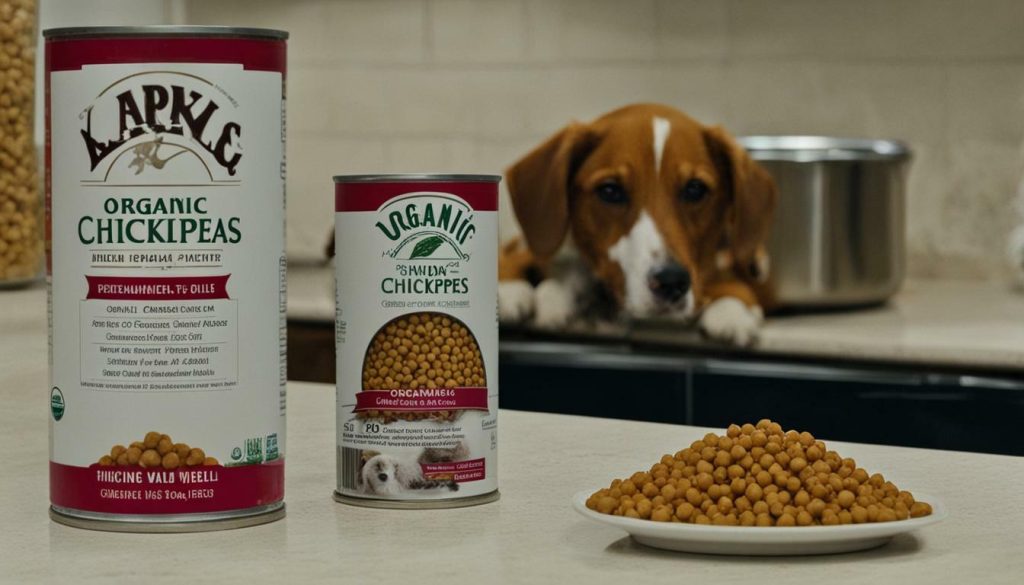
| Pros | Cons |
|---|---|
| Convenient and ready to serve | Potential excess salt content |
| Nutritious and provide essential nutrients | Some cans may contain added seasonings |
| Good source of protein and fiber | Should be fed in moderation |
In conclusion, canned chickpeas can be a healthy and tasty treat for your dog when used responsibly. By rinsing the chickpeas and feeding them in moderation, you can provide your pup with the benefits of this nutritious legume without compromising their well-being. Remember to consult your veterinarian for personalized feeding guidelines and enjoy your furry friend’s delight as they savor this delicious snack!
The Risks of Hummus and Seasonings
While chickpeas themselves are safe for dogs, certain variations like hummus and seasoned chickpeas can pose potential risks to their health. Hummus, a popular Middle Eastern dip made from cooked and mashed chickpeas, typically contains ingredients like garlic and onion, which are toxic to dogs. These ingredients can cause gastrointestinal upset, digestive issues, and even more serious health problems, such as anemia.
It’s important to note that dogs have a different digestive system than humans, and their bodies may not tolerate spices or seasonings well. Additional ingredients like salt, pepper, or other spices commonly found in seasoned chickpeas can lead to upset stomach, diarrhea, or even allergic reactions in some dogs. To ensure the safety and well-being of your furry friend, it’s best to avoid giving them hummus or seasoned chickpeas altogether.
Instead, if you’d like to incorporate chickpeas into your dog’s diet, opt for plain, cooked chickpeas without any added spices or seasonings. You can prepare them by soaking dried chickpeas overnight to improve digestibility, followed by boiling or pressure cooking until they are soft. Plain cooked chickpeas can be added to your dog’s regular food or used as a treat, in moderation.
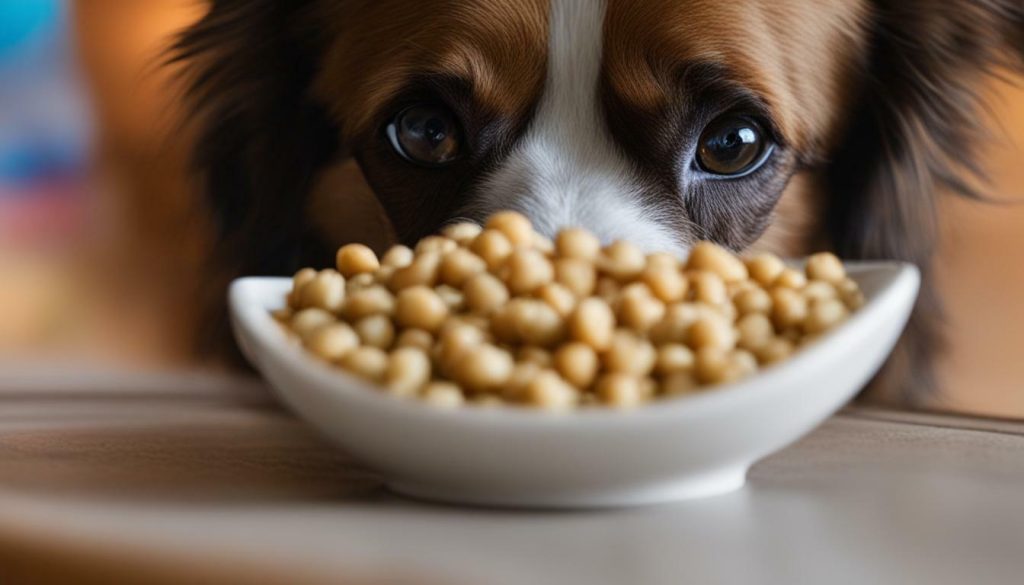
Table: Potential Risks of Hummus and Seasoned Chickpeas for Dogs
| Potential risks | Effects on dogs |
|---|---|
| Toxic ingredients like garlic and onion | Gastrointestinal upset, digestive issues, anemia |
| Spices and seasonings | Upset stomach, diarrhea, allergic reactions |
Remember, when it comes to giving your dog chickpeas, always stick to plain, cooked chickpeas and avoid any variations that may contain harmful ingredients. Your dog’s health and well-being should always be the top priority!
Raw Chickpeas vs. Cooked Chickpeas for Dogs
Raw chickpeas can be tough for dogs to digest, so it’s essential to cook them thoroughly before including them in your dog’s meals. Cooking not only softens the chickpeas but also makes them more palatable for your furry friend. When properly cooked, chickpeas can provide a healthy dose of protein, fiber, and other essential nutrients that contribute to your dog’s well-being.
To cook chickpeas for your dog, start by soaking them in water overnight. This process helps remove any anti-nutrients, making the chickpeas easier to digest. Once soaked, drain the water and rinse the chickpeas before transferring them to a pot. Add fresh water, ensuring that the chickpeas are fully submerged, and bring to a boil. Reduce the heat and allow them to simmer until they are soft and tender.
Once cooked, you can use chickpeas in various ways to enhance your dog’s meals. Mash them and mix them with your dog’s regular food, add them as a topping, or include them in homemade treats. Remember to serve them in moderation, as chickpeas should only make up a small portion of your dog’s overall diet. A general guideline is to feed around 1 to 2 tablespoons of cooked chickpeas per 10 pounds of body weight.
The Benefits of Cooked Chickpeas for Dogs
Cooking chickpeas not only improves digestibility but also unlocks their nutritional benefits for your dog. Cooked chickpeas are a great source of plant-based protein, which is essential for muscle development and overall growth. They are also high in dietary fiber, which promotes a healthy digestive system and helps regulate blood sugar levels. Additionally, chickpeas contain essential vitamins and minerals, such as folate, manganese, and magnesium, that contribute to your dog’s overall health.
| Nutrient | Per Cup (164g) |
|---|---|
| Protein | 14.5g |
| Fiber | 12.5g |
| Folate | 282mcg |
| Manganese | 1.7mg |
| Magnesium | 78mg |
As always, it’s crucial to consult your veterinarian before making any changes to your dog’s diet, including introducing chickpeas. They can provide personalized guidance based on your dog’s unique needs and dietary requirements. With proper preparation and portion control, cooked chickpeas can be a safe and nutritious addition to your dog’s meals.
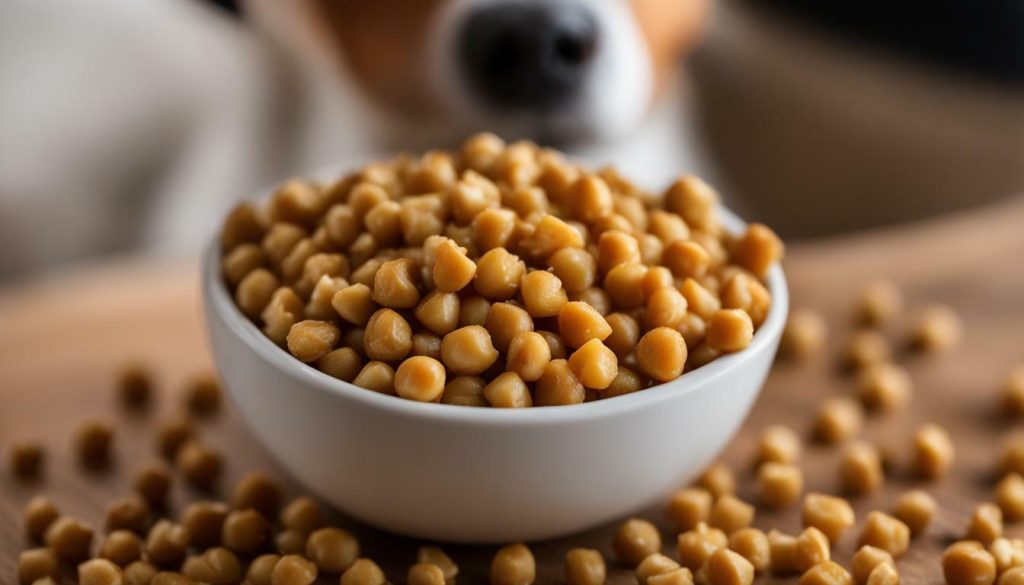
Roasted Chickpeas: A Cautionary Note
While roasted chickpeas may seem tempting as a crunchy snack for your dog, it’s important to be cautious due to potential added spices and seasonings. Some roasted chickpea products available in stores may contain ingredients that are not safe for dogs, such as garlic or onion powder. These ingredients can be harmful to dogs and may cause digestive upset or even toxicity.
When it comes to roasted chickpeas for dogs, it is best to opt for plain, unseasoned varieties. This way, you can ensure that your furry friend is enjoying a healthy and safe treat. Homemade plain roasted chickpeas can be a great option, as you have control over the ingredients and can avoid any potentially harmful additives.
Remember to always consult with your veterinarian before introducing any new food or treat into your dog’s diet. They can provide personalized guidance based on your dog’s specific needs and any dietary restrictions or allergies they may have. By taking these precautions, you can ensure that your dog enjoys the benefits of chickpeas without any risks.
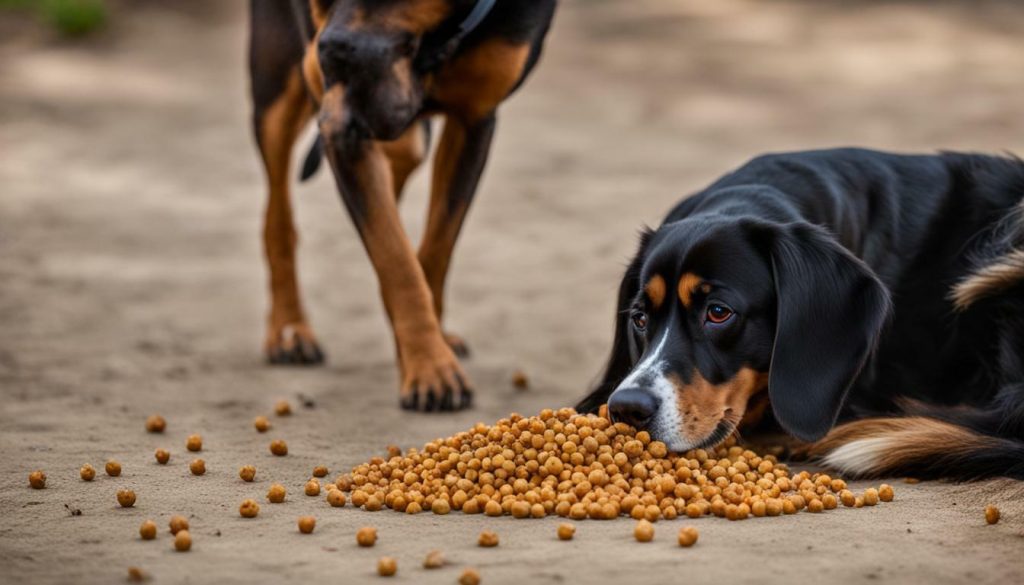
In summary, while chickpeas can be a healthy addition to a dog’s diet, it’s important to be aware of the potential risks associated with roasted chickpeas. Stick to plain varieties to avoid any harmful ingredients and always prioritize your dog’s safety and well-being. By making informed choices, you can provide your furry friend with nutritious and delicious treats that they can enjoy without any worries.
Including Chickpeas in Your Dog’s Diet
Now that you know the benefits and precautions associated with feeding chickpeas to your dog, let’s explore how to include them in their regular meals. Chickpeas can be a nutritious addition to your dog’s diet, providing them with essential nutrients and promoting overall health.
One way to incorporate chickpeas into your dog’s meals is by mixing them with their regular food. You can mash cooked chickpeas and add them to your dog’s kibble or wet food. This not only enhances the flavor but also boosts the nutritional content of their meal. Start by adding a small amount and gradually increase the portion to avoid any digestive upset.
Another option is to make homemade dog treats using chickpea flour. Chickpea flour is a great alternative to traditional flours as it is gluten-free and packed with protein. You can find chickpea flour at most grocery stores or make your own by grinding dried chickpeas into a fine powder. There are various recipes available online for chickpea flour dog treats that you can bake or dehydrate. Just make sure to choose recipes that do not include any harmful ingredients such as onions or garlic.
| Tips for Feeding Chickpeas to Your Dog: |
|---|
| 1. Cook chickpeas thoroughly before feeding them to your dog to ensure easy digestion. |
| 2. Serve chickpeas in moderation as a supplement to your dog’s regular diet, not as a replacement for complete and balanced dog food. |
| 3. Avoid adding spices or seasonings to chickpeas when preparing them for your dog. |
| 4. Rinse canned chickpeas to remove excess salt before feeding them to your dog. |
| 5. Always monitor your dog for any signs of allergies or digestive issues when introducing new foods, including chickpeas. |
Remember, every dog is unique, and their dietary needs may vary. It is always a good idea to consult with your veterinarian before making any significant changes to your dog’s diet. They can provide personalized advice based on your dog’s age, breed, and overall health.
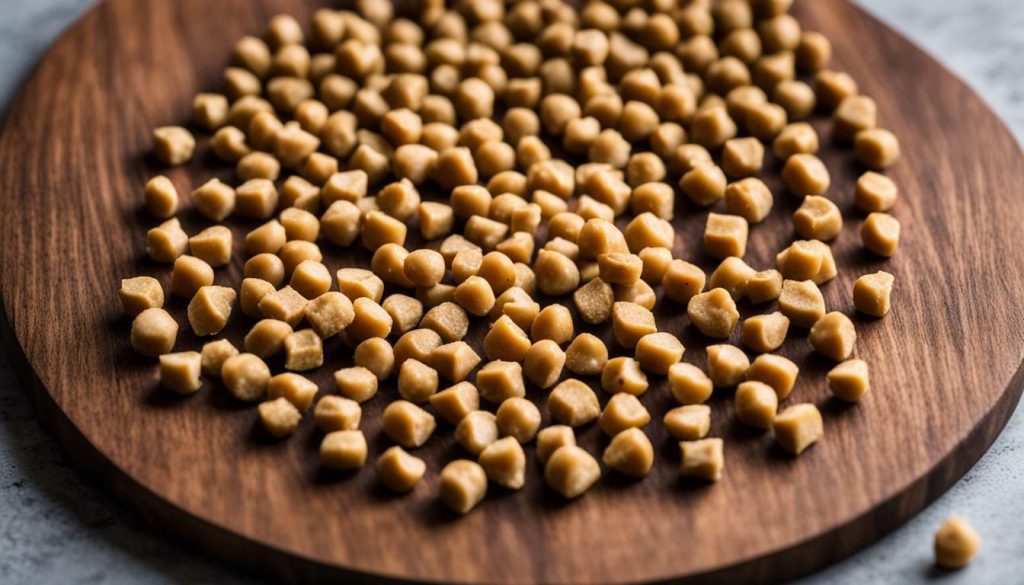
By including chickpeas in your dog’s diet, you can provide them with a wholesome and nutritious food option. Just remember to prepare and serve chickpeas in a way that is safe and suitable for your furry friend. With the right approach, you can enjoy the benefits of chickpeas together!
Conclusion
In conclusion, dogs can safely eat chickpeas in moderation as part of a balanced diet, offering them a healthy source of protein, fiber, and essential nutrients. Chickpeas, also known as garbanzo beans, are packed with beneficial nutrients that can contribute to a dog’s overall well-being.
Rich in protein, chickpeas can help support muscle growth and repair, making them an excellent addition to a dog’s diet, especially for those with dietary restrictions or sensitivities. Additionally, the high fiber content in chickpeas promotes healthy digestion and can aid in maintaining a healthy weight.
It is important to note that while chickpeas are generally safe for dogs, certain precautions should be taken. Avoid giving dogs chickpeas with added spices, as these can be harmful to their digestive system. Instead, opt for plain cooked chickpeas or chickpea flour when preparing homemade treats.
Furthermore, canned chickpeas should be rinsed thoroughly to remove excess salt before offering them to dogs. Hummus, a popular chickpea-based dip, should be avoided due to the presence of garlic and onion which can be toxic to dogs.
Overall, when prepared and served appropriately, chickpeas can be a nutritious and delicious addition to a dog’s diet. Remember to introduce them gradually and in moderation, monitoring your dog’s response for any signs of allergies or digestive issues. By doing so, you can ensure that your furry friend enjoys the many health benefits that chickpeas have to offer.
FAQ
Can dogs eat chickpeas?
Yes, dogs can safely consume chickpeas. They are a healthy source of protein, fiber, and essential vitamins and minerals.
Are chickpeas safe for dogs?
Chickpeas are generally safe for dogs to eat. However, it is important to feed them in moderation and avoid adding spices or seasonings.
How should I prepare chickpeas for my dog?
Raw chickpeas are difficult to digest, so it is recommended to soak and cook them before feeding them to your dog. You can also use chickpea flour to make homemade treats.
Can dogs eat canned chickpeas?
Yes, you can feed your dog canned chickpeas. However, it is important to rinse them to remove excess salt before offering them to your furry friend.
Is hummus safe for dogs?
No, hummus should not be given to dogs. It often contains additional ingredients like garlic and onion, which can be harmful to them.
Can dogs eat roasted chickpeas?
It is best to avoid giving dogs roasted chickpeas unless they are cooked plain, without any added spices. Some roasted chickpeas may contain ingredients that are not safe for dogs.
How often can I include chickpeas in my dog’s diet?
Chickpeas can be a healthy addition to your dog’s diet, but it is recommended to serve them in moderation. Ask your veterinarian about the appropriate serving size and frequency for your specific dog.

